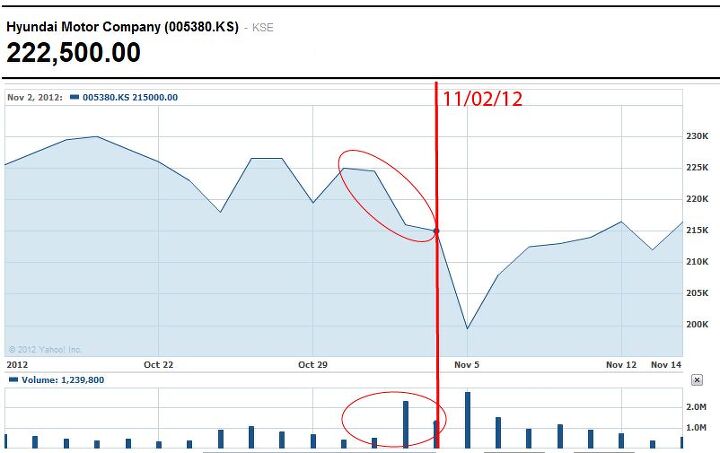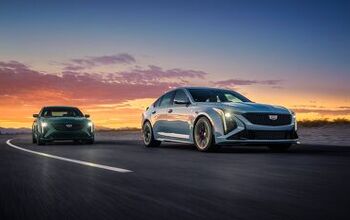After The Hyundai EPA Scandal, The Stench Of Insider Trading

Possibly a bigger scandal is following Hyundai’s MPG brouhaha: There is a stench of insider trading. “This smells pretty bad,” Robert Boxwell, director of consulting firm Opera Advisors in Kuala Lumpur who has studied insider dealing patterns, tells Reuters.
On November 2, 2012, it was announced that Hyundai and Kia had overstated the fuel economy ratings on many of its cars. Not surprisingly, the Hyundai share did a nosedive on the news. However, the stock had already cratered before the announcement. The stock fell 4 percent on November 1 with about 2.2 million shares changing hands, the highest trading volume of the year at that point.
Some say, it is par for the course at Asian bourses. “The idea that insider trading is wrong rather than smart is only being ingrained in the current generation of Asian players, not the older generation who are often still in the driving seat,” said Peter Douglas, founder of GFIA, a hedge fund consultancy in Singapore, told Reuters.

Bertel Schmitt comes back to journalism after taking a 35 year break in advertising and marketing. He ran and owned advertising agencies in Duesseldorf, Germany, and New York City. Volkswagen A.G. was Bertel's most important corporate account. Schmitt's advertising and marketing career touched many corners of the industry with a special focus on automotive products and services. Since 2004, he lives in Japan and China with his wife <a href="http://www.tomokoandbertel.com"> Tomoko </a>. Bertel Schmitt is a founding board member of the <a href="http://www.offshoresuperseries.com"> Offshore Super Series </a>, an American offshore powerboat racing organization. He is co-owner of the racing team Typhoon.
More by Bertel Schmitt


































Comments
Join the conversation
"If it walks like a duck, and smells like a duck "
Some people will see conspiracies in just about anything...
What caused the fairly significant dip on the 24th of October? Why did the slide pause before its big drop on Nov.2? Why a duck?
Complete BS. For a credible analysis, you need to prove: 1) Other car companies didn't drop at that same time. If they did, that must be due to a common risk, such as fiscal cliff blah blah. 2) The drop is substantially greater than the typical volatility of that stock. Analyze the volatility for the past 5~10 years, map a volatility index vs. chance of insider trading graph.